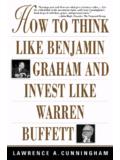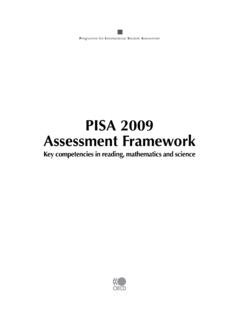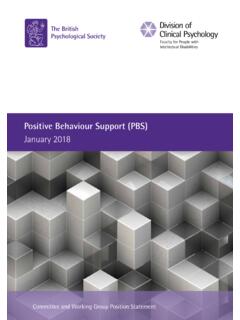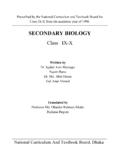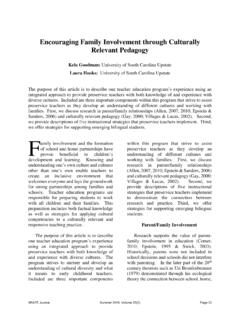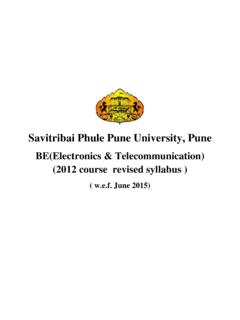Transcription of Accounting theory and conceptual frameworks
1 8 Accounting theory andconceptual frameworksAfter studying this chapter you should be able to:&explain what Accounting theory is&describe the main attempts at constructing an Accounting theory &appraise current developments in the area&describe and discuss the contents of the IASB framework &appraise the quality and usefulness of the IASB framework in the context of itsself-declared purposes&describe and discuss the parts of IAS 1 relating to Accounting concepts andpolicies&appraise the overall effect of the framework and comparable parts of IAS chapter is about to deal with something that many people believe does not exist asingle generally accepted Accounting theory .
2 There is no generally accepted accountingtheory at this time even though many attempts have been made to formulate to Eldon S. Hendriksen inAccounting theory (1977), theory as it applies to Accounting is the coherent set of hypothetical, conceptualand pragmatic principles forming the general frame of reference for a field ofinquiry. Thus Accounting theory may be defined as logical reasoning in the formof a set of broad principles that1 Provide a general frame of reference by which Accounting practices can beevaluated and2 Guide the development of new practices and theory may also be used to explain existing practices to obtain abetter understanding of them.
3 But the most important goal of Accounting theoryshould be to provide a coherent set of logical principles that form the generalframe of reference for the evaluation and development of sound s compare this with what many believe is the Accounting framework , the IASCF ramework for the Preparation and Presentation of Financial Statements. This Frameworkpurports to:1assist the board of IASC in the development of standards and review of existingstandards2provide a basis for reducing the number of permitted alternative Accounting treatments3assist preparers in dealing with topics that have yet to form the subject of a certainly sounds like an Accounting theory .
4 But if it is, then this theory wouldclearly determine how we should provide information to users and different practiceswould not prevail. The primary purpose of an Accounting theory should be to provide abasis for the prediction and explanation of Accounting behaviour and an Accounting theory possible?According to both Hendriksen (1977) and McDonald (1972) the development of anaccounting theory should be possible. McDonald argues that a theory must have threeelements:1encoding of phenomena to symbolic representation2manipulation or combination according to rules3translation back to real-world the three elements that McDonald states are necessary for a theory exist inaccounting?
5 Activity feedbackThe first obviously exists as we have the symbols of debits and credits and we have alsodeveloped Accounting terminology depreciation, accruals, matching, current cost,revaluation etc. all unique to second also exists as we have a wealth of rules and regulations for manipulating orcombining these debits and is evidenced in how we present these debits and credits to users in the formof financial to the formulation of Accounting theoryIf itispossible to develop an Accounting theory (Hendriksen and McDonald) then how dowe approach its development? Research in this area has centred on traditional approaches,regulatory approaches and what has come to be regarded as new approaches.
6 We will lookbriefly at each of these three AN Accounting theory POSSIBLE?115 Traditional approachesTraditional approaches cover:&non-theoretical& approaches to Accounting theory are concerned with developing atheory or Accounting techniques and principles that will be useful to users, particularlydecision makers. This approach can be developed in a pragmatic or authoritarian essence this is the approach the Accounting profession has used in the past to developan Accounting theory and it is fairly apparent it has not been able to resolve conflict inaccounting practices or principles.
7 Theoretical approaches to the development of anaccounting theory are many but Belkaoui, in his textAccounting theory , categorizesthese as:&deductive&inductiveðical&sociolog ical&economic& approachThis approach involves developing a theory from basic propositions, premises andassumptions which results in Accounting principles that are logical conclusions about thesubject. The theory is tested by determining whether its results are acceptable in and Bell (1961) are deductive theorists (Chapter 4) and historical cost accountingwas also derived from a deductive approachFor this approach we start with observed phenomena and move towards generalizedconclusions.
8 The approach requires empirical testing, the theory must be supported bysufficient instances/observations that support the derived conclusions. Quite often thedeductive and inductive approaches are mixed as researchers use their knowledge ofaccounting practices. As Riahi-Belkaoui states: General propositions are formulatedthrough an inductive process, but the principles and techniques are derived by a deductiveapproach. He also observes that when an inductive theorist, Littleton (1935), collaborateswith a deductive theorist, Paton (1922), a hybrid results showing compromise between thetwo approachActivity concepts that could be at the core of the ethical approach to an theory AND conceptual FRAMEWORKSA ctivity feedbackBasically, this approach consists of the concepts of true and fair.
9 These concepts have, ofcourse, been taken on board by the EU in the Fourth in this area are D. R. Scott (1941) and Yu (1976).Sociological approachThis is actually an ethical approach that centres on social welfare. In other words, Accounting principles and techniques are evaluated for acceptance after considering alleffects on all groups in society. Thus within this approach we would need to be able toaccount for a business entity s effect on its social environment. We consider this type ofreporting in Chapter approachThis approach focuses on general economic welfare.
10 Thus Accounting principles andtechniques are evaluated for acceptance depending on their impact on the nationaleconomy. Sweden, in its national GAAP, uses an economic approach to its IASB in developing its standards does tend to take an economic approach intoaccount. For example, the current discussion on Accounting for leases focuses on theeffect that a standard requiring the capitalization of all leases, whether finance oroperating, might have on the economy or business in general. Traditionally, accountingstandards have been set without considering economic consequences but lobby pressuresfrom groups who perceive themselves as being affected can be approachThis is perhaps our current approach where we have a combination of all the approachesalready identified appearing in our Accounting theory .


